Mercedes Vito Bus vs Mitsubishi Space Star – Differences & prices compared
Compare performance, boot space, consumption and price in one view.
Find out now: which car is the better choice for you – Mercedes Vito Bus or Mitsubishi Space Star?
The Mercedes Vito Bus (Bus) comes with a Diesel, Electric or Petrol engine and Automatic transmission. In comparison, the Mitsubishi Space Star (Hatchback) features a Petrol engine with Manuel or Automatic transmission.
When it comes to boot capacity, the Mercedes Vito Bus offers 1390 L, while the Mitsubishi Space Star provides 235 L – depending on how much space you need. If you’re looking for more power, decide whether the 237 HP of the Mercedes Vito Bus or the 71 HP of the Mitsubishi Space Star suits your needs better.
In terms of consumption, the values are 26.70 kWh6.70 L per 100 km for the Mercedes Vito Bus, and 4.90 L for the Mitsubishi Space Star.
Price-wise, the Mercedes Vito Bus starts at 36300 £, while the Mitsubishi Space Star is available from 11600 £. Compare all the details and find out which model fits your lifestyle best!
Mercedes Vito Bus
The Mercedes-Benz Vito Bus offers a versatile solution for those in need of spacious and comfortable group transportation. Its refined interior is designed to enhance passenger comfort, making it ideal for both business and leisure travel. With a focus on safety and efficiency, it provides a reliable driving experience that aligns with the high standards expected of the Mercedes-Benz brand.
details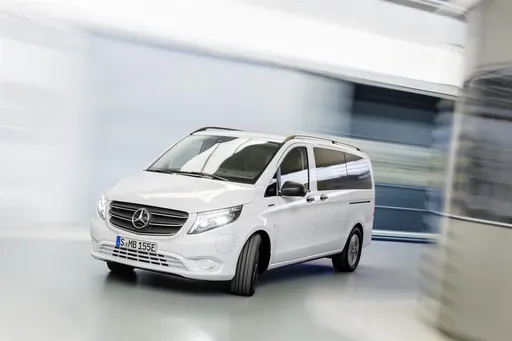
Mitsubishi Space Star
The Mitsubishi Space Star offers a compact yet surprisingly spacious experience, making it an ideal choice for urban dwellers who need agility and comfort. Its sleek design is complemented by a range of vibrant colour options, adding a touch of flair to everyday commutes. With a focus on efficiency and practicality, the Space Star combines a user-friendly interface with modern technology to ensure a smooth driving experience.
details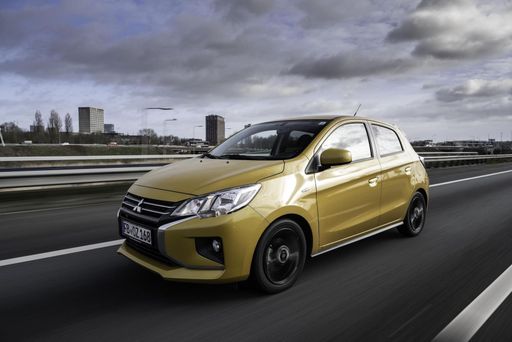 @ presse.mitsubishi-motors.de
@ presse.mitsubishi-motors.de
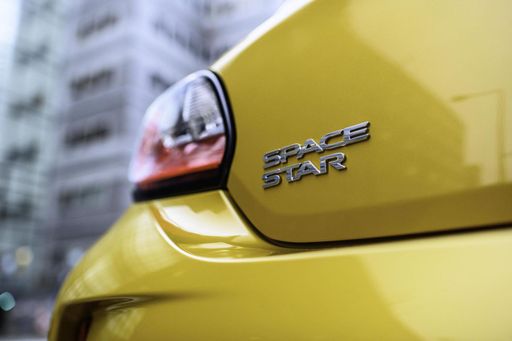 @ presse.mitsubishi-motors.de
@ presse.mitsubishi-motors.de
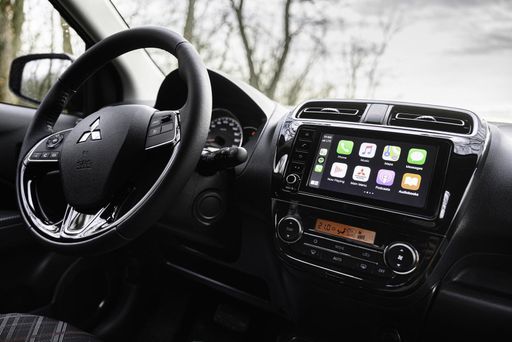 @ presse.mitsubishi-motors.de
@ presse.mitsubishi-motors.de
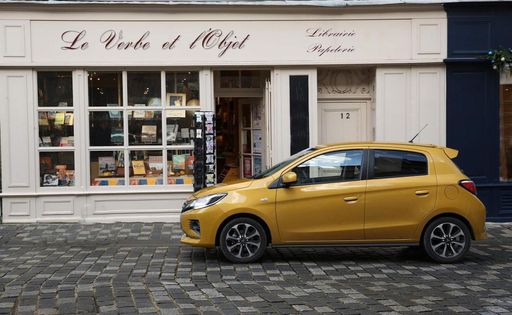 @ presse.mitsubishi-motors.de
@ presse.mitsubishi-motors.de

|

|
|
|
|
Costs and Consumption |
|
|---|---|
|
Price
36300 - 55000 £
|
Price
11600 - 18700 £
|
|
Consumption L/100km
6.7 - 10 L
|
Consumption L/100km
4.9 - 5.5 L
|
|
Consumption kWh/100km
26.7 - 26.9 kWh
|
Consumption kWh/100km
-
|
|
Electric Range
248 - 370 km
|
Electric Range
-
|
|
Battery Capacity
60 - 90 kWh
|
Battery Capacity
-
|
|
co2
0 - 228 g/km
|
co2
112 - 125 g/km
|
|
Fuel tank capacity
57 - 70 L
|
Fuel tank capacity
35 L
|
Dimensions and Body |
|
|---|---|
|
Body Type
Bus
|
Body Type
Hatchback
|
|
Seats
8
|
Seats
5
|
|
Doors
4
|
Doors
5
|
|
Curb weight
2023 - 2739 kg
|
Curb weight
940 - 1009 kg
|
|
Trunk capacity
580 - 1390 L
|
Trunk capacity
209 - 235 L
|
|
Length
4895 - 5370 mm
|
Length
3845 mm
|
|
Width
1928 mm
|
Width
1665 mm
|
|
Height
1890 mm
|
Height
1505 mm
|
|
Payload
726 - 1077 kg
|
Payload
360 - 400 kg
|
Engine and Performance |
|
|---|---|
|
Engine Type
Diesel, Electric, Petrol
|
Engine Type
Petrol
|
|
Transmission
Automatic
|
Transmission
Manuel, Automatic
|
|
Transmission Detail
Automatic Gearbox
|
Transmission Detail
Manual Gearbox
|
|
Drive Type
Rear-Wheel Drive, All-Wheel Drive, Front-Wheel Drive
|
Drive Type
Front-Wheel Drive
|
|
Power HP
136 - 237 HP
|
Power HP
71 HP
|
|
Acceleration 0-100km/h
-
|
Acceleration 0-100km/h
14.1 - 15.8 s
|
|
Max Speed
140 km/h
|
Max Speed
163 - 167 km/h
|
|
Torque
330 - 500 Nm
|
Torque
102 Nm
|
|
Number of Cylinders
4
|
Number of Cylinders
3
|
|
Power kW
100 - 174 kW
|
Power kW
52 kW
|
|
Engine capacity
1950 - 1999 cm3
|
Engine capacity
1193 cm3
|
General |
|
|---|---|
|
Model Year
2024
|
Model Year
2020 - 2023
|
|
CO2 Efficiency Class
G, A
|
CO2 Efficiency Class
C, D
|
|
Brand
Mercedes-Benz
|
Brand
Mitsubishi
|
Mercedes Vito Bus
The Mercedes Vito Bus: A Comprehensive Look at Innovation and Performance
In the automotive world, the Mercedes Vito Bus stands out as a versatile and reliable choice for those in need of a spacious and efficient mode of transport. With a reputation for engineering excellence, Mercedes-Benz has once again delivered with the latest versions of the Vito Bus. This article delves into the technical aspects, innovations, and what makes the Vito Bus a prime option in its segment.
Engine Power and Efficiency
The Mercedes Vito Bus offers a remarkable range of engine configurations, catering to both diesel and electric powertrains. The diesel models come with options ranging from 136 HP to a powerful 237 HP. The robust four-cylinder diesel engines are designed for efficiency, offering a range of fuel consumption figures from 6.7 L to 7.8 L per 100 kilometers, depending on the variant. Meanwhile, the electric eVito Tourer provides an impressive alternative with a power output of 204 HP and offers ranges of up to 371 kilometers on a single charge, making it a frontrunner in sustainable transportation solutions.
Transmission and Drivetrain Options
The Vito Bus is equipped with both manual and automatic transmission options, ensuring a drive tailored to user preferences. The 9G-TRONIC automatic gearbox is notable for its smooth transitions, enhancing the driving experience. Customers can choose between rear-wheel drive and the adaptable all-wheel drive system. The introduction of the eVito Tourer's front-wheel drive system further expands the versatility of the lineup, offering an electric alternative for urban and rural environments alike.
Interior Comfort and Practicality
The interior of the Vito Bus is designed with comfort and convenience in mind. Capable of seating up to eight passengers, the spacious cabin is ideal for family travel or business transportation. The Vito Bus offers three body lengths—kompakt, lang, and extralang—providing flexibility to accommodate different passenger and cargo requirements. The well-thought-out design ensures ample storage with trunk capacities ranging up to 1,390 liters in certain configurations.
Advanced Innovations
Mercedes-Benz has equipped the Vito Bus with a host of advanced technological features. The focus on safety is evident, with systems like Crosswind Assist and Attention Assist, ensuring greater control and alertness on the road. The eVito Tourer comes with the latest in electric vehicle technology, including efficient battery management systems that optimize range and performance.
Performance and Dynamics
The Vito Bus showcases impressive performance metrics across its variants. With a maximum torque ranging from 330 Nm to 500 Nm, the Vito Bus ensures a responsive and agile driving experience. The consistent build quality and dynamic chassis contribute to a pleasing ride, whether navigating city streets or cruising on the highway.
Conclusion
The Mercedes Vito Bus continues to be a leading choice for those looking for a reliable and performance-oriented vehicle. With its diverse range of engine options, innovative features, and versatile configurations, the Vito Bus meets the demands of both personal and professional transportation. The introduction of electric variants highlights Mercedes-Benz's commitment to sustainability without compromising on power or range. As the automotive industry continues to evolve, the Vito Bus exemplifies the blend of traditional excellence and forward-thinking innovation.
Mitsubishi Space Star
Introducing the Mitsubishi Space Star: A Perfect Blend of Efficiency and Innovation
The Mitsubishi Space Star continues to impress urban drivers with its compact yet efficient design. Celebrated for its practicality and fuel economy, this hatchback offers a unique blend of new-age technology and reliable performance. Let’s dive into some of the technical details and innovations that make the Space Star a popular choice among compact car enthusiasts.
Engine and Performance
The Space Star is powered by a 1.2-litre, 3-cylinder petrol engine, delivering a respectable 71 PS (52 kW). The engine provides a harmonious balance of power and efficiency, reaching a top speed of up to 167 km/h. With a torque of 102 Nm, drivers can expect smooth city rides and decent highway cruising capabilities. The Space Star's economy ranges from 4.9 to 5.5 litres per 100 kilometres, ensuring that your journeys remain budget-friendly and environmentally considerate.
Transmission and Driving Dynamics
When it comes to the driving experience, buyers have the option of a 5-speed manual transmission or a CVT automatic. This flexibility allows for a more personalised driving experience, whether you prefer the engagement of manual shifting or the convenience of an automatic gearbox. The car's front-wheel-drive setup further enhances its maneuverability, making it an ideal companion for navigating tight city streets.
Design and Dimensions
The Mitsubishi Space Star is designed to turn heads with its sleek, aerodynamic lines while maintaining a practical size. Measuring 3845 mm in length, 1665 mm in width, and 1505 mm in height, it's a perfect fit for urban driving. Despite its compact form, the Space Star offers five seats and five doors, providing ample accessibility and comfort for both the driver and passengers.
Interior Features and Comfort
Inside, the Space Star prioritises comfort and convenience with thoughtfully designed interiors. The luggage space ranges from 209 to 235 litres, ideal for shopping trips or weekend getaways. The vehicle comes in a variety of trim levels, including Basis, Plus, Select, and Top, with each offering distinct features to meet different customer needs. Whether you need basic amenities or more premium touches, the Space Star has a version that will suit your lifestyle.
Safety and Environmental Impact
Safety innovation is a hallmark of the Mitsubishi Space Star, ensuring peace of mind for drivers and passengers alike. Its CO2 efficiency class ranges from C to D, with emissions between 112 to 125 g/km, reflecting its dedication to reducing the environmental footprint. These features contribute to making the Space Star a responsible choice for the eco-conscious driver.
Cost of Ownership
Affordability is another attractive aspect of the Space Star. Prices range from €13,590 to €21,790, making it accessible for a wide array of budgets. Running costs are equally competitive, with monthly expenses estimated between €627 and €767, and cost per kilometre ranging from 25.1 to 30.7 cents, all contributing to a car that is as economical to own as it is to drive.
Conclusion
In summary, the Mitsubishi Space Star offers a compelling package of efficiency, practicality, and modern technology. Its combination of fuel economy, flexible transmission options, and affordability make it a standout choice in the compact car segment. For those looking for a reliable and economical city car, the Space Star remains a strong contender that shouldn't be overlooked.
The prices and data displayed are estimates based on German list prices and may vary by country. This information is not legally binding.
